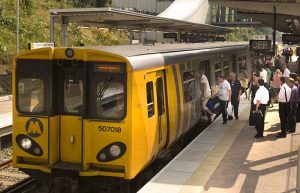In the second of a series of three blog posts, pteg Support Unit Director Jonathan Bray continues his look back over ten years of the pteg Support Unit. Ten years of the pteg Support Unit: The unstoppable force of devolution

Devolution has seen Merseyrail Electrics transform into one of the best performing rail networks in the country
Some of the votes on devolution to Wales, Scotland and London were tight. They wouldn’t be if they were re-run now. And devolution has been good for transport. London is the most striking example with just about every aspect of transport in the capital either transformed for the better, or in the process of being transformed. Rail investment has also rocketed in Scotland. Some of the best performing rail routes are also those that have been devolved – London Overground and Merseyrail Electrics in particular. The trouble is that for England outside London what tier of governance you devolve to is less clear cut. Regions, city regions, Counties, Districts – what you do for one area has implications for others. This, coupled with the Metropolitan policy elite’s disdain for inquiring too deeply (see Part one) has led to both this and the previous government layering on various initiatives which don’t always relate to each other and lack sufficient decisiveness. Whitehall too is reluctant to fully let go – because now that Scotland, Wales and London are gone – there’s only the rest of England left to play with. So progress is slow, messy and fitful but it’s happening – and it is a one way process. Ultimately though, the logic of having local public transport services controlled locally will prevail and our major cities will have transport systems and planning arrangements that will look and feel more like those in London and in cities across Europe. We will get there in the end.
The rise and rise of rail

Rail is now seen as a symbol of the future – rather than of the past (Picture: Priestmangoode)[/caption] Fifty years ago Beeching slashed and burned as much of the rail network as he could get away with. And in the decades that followed the rail network was constantly having to fend off a Whitehall establishment that saw rail as a costly problem bequeathed to them by an earlier era that sooner or later they would deal with decisively and terminally. But in the last ten years or so there’s been an extraordinary turn around. Not least because there’s been a boom in rail traffic. Particularly on our city region networks – where growth has outstripped that of London and the South East as people commute further and in greater numbers to access the jobs and opportunities in revitalised core city centres. Rail now looks more like the future and less like the past. HS2 symbolises all of that. After decades as being seen as a costly problem to be managed down to size, rail is seen as part of the solution not the problem. Rail is something that politicians of all kinds want to be associated with. There’s also a sense recently that some of rail’s stardust has settled on the other modes. The recently flurry of investment and expansion of tram schemes – with, most notably, Manchester Metrolink becoming a full on network. And even the bus has lost some of its ‘loser cruiser’ stigma with the Metropolitan policy elite in the last year or so. The bus is now seen as a respectable policy option – if not yet a cool one! The protection of BSOG in the Spending Review being one sign of that.
The battle for the bus
The bus is local public transport for most people outside London. Yet because buses in London are sorted and the bus lacks social cache, bus services outside London had largely been left to decline. Part of a gentlemen’s agreement between Whitehall and the large operators that the bus operators would pretend to compete with each other while Whitehall would pretend to care about falling patronage and rising fares. And whilst the media was hypnotised by every twist and turn of the politics and profits of rail privatisation they let the massive profits being generated off the back of the poorest people in Britain by deregulated bus services outside London go unreported and unexplored. Even though it’s been these profits that have actually been fuelling the wider global ambitions of the big groups. Meanwhile local government in general had slipped into cosy ‘decline management ‘mode on bus. How sloppy were things before we got stuck in? Not long before we started the DfT seconded a senior official to work for CPT on policy, media and public affairs (a fairly easy job lobbying yourself!); maintenance standards were so shoddy wheels were coming off First Group buses in service; and the Traffic Commissioners were regularly dealing with truly appalling early, late and non-running – because even the largest operators knew they could get away with it.

New alliances are being forged in support of bus, as our recent ‘Case for the Urban Bus’ event showed. (L-R): Konstanze Scharring, Director of Policy, SMMT; Stephen Joseph, Chief Executive, Campaign for Better Transport; David Brown, Chair, pteg; Pedro Abrantes, Economist, pteg; Claire Haigh, Chief Executive, Greener Journeys; Dr Janet Atherton, President, Association of Directors of Public Health; and Tony Travers, Director, LSE. Picture by Andrew Ward andrew@reportphotos.com
We changed all that. We put some sharp dividing lines into the bus debate. We dragged bus policy out of the shadows and into the public arena. We had to fight unbelievably hard against Ministers who too often sided with their hostile officials to get some workable legislation for local transport authorities to improve bus services and we worked together as a network to put that legislation into practice. We were vilified for doing this not only by the operators (fair enough) but also by their legions of spear carriers – including the world’s most craven trade press and the extensive selection of organisations and individuals who in one way or another are on the bus companies payroll and whose main job it is to enforce a ‘partnership’ (deregulation) consensus at all costs. We kept going regardless and by doing so the bus is in a far better place than it was ten years ago. At the very least the bus operators know that they have to be seen to push to the very limits what can be achieved in a deregulated environment – which is increasingly guided by legal agreements which came out of the 2008 Local Transport Act. Meanwhile our tenth anniversary saw the first move by a Local Transport Authority (Nexus) to trigger the statutory process for the franchising of bus services (a ‘Quality Contract’) which if it goes ahead will allow bus services to be properly planned and managed and make Tyne and Wear the first conurbation outside London to enjoy the benefits of simple, smart and integrated zonal ticketing across the modes.
Jonathan Bray
Read Part three in the series ‘Ten years of the pteg Support Unit’ which looks at the way we work and the way cities will work in the future. > < Read Part one in the series ‘Ten years of the pteg Support Unit’ featuring top ten highlights of the last ten years plus the influence of London.